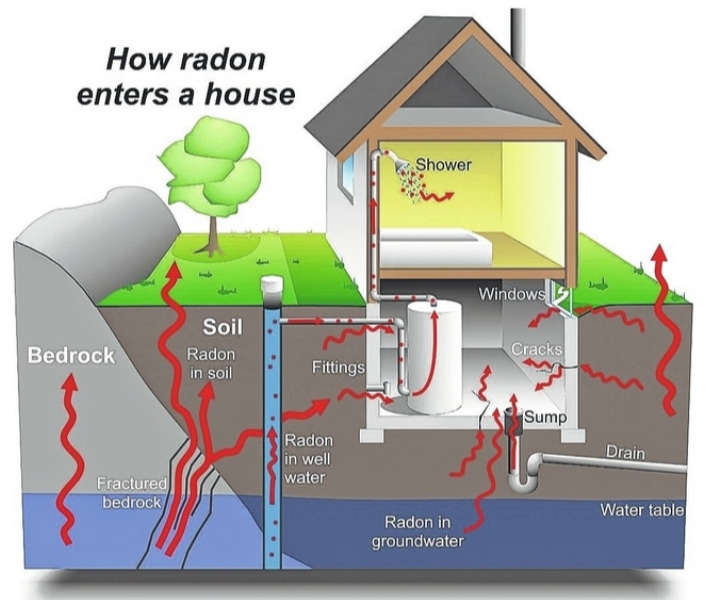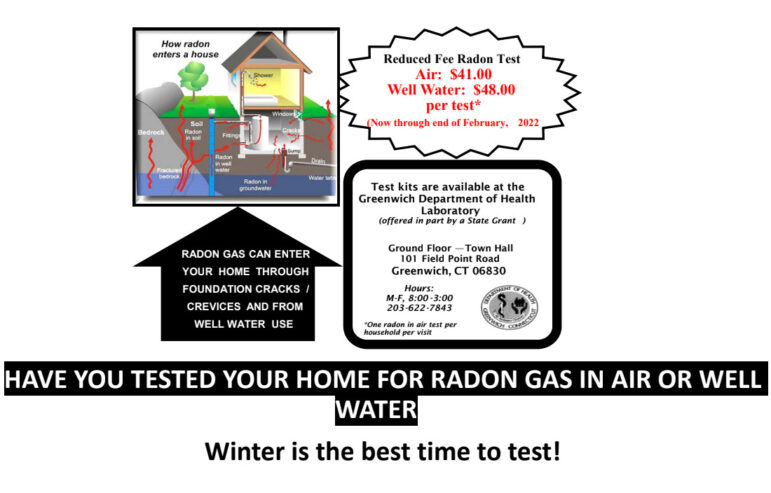Radon is a radioactive gas that occurs naturally and is scientifically linked to lung cancer (EPA) (ALA). This comes up in discussions when we are building or buying a home or renting a property. We know it’s not a good thing, but what do we actually know about radon? Being an informed homeowner or renter can protect your health and that of your family. Being uninformed on this topic can place you and your loved ones in needless jeopardy. You can’t see radon. You can’t taste it or smell it circulating in the air you breathe or in the water you drink, yet it is a cause of lung cancer in both smokers and non-smokers alike.

Radon can enter your home through air that rises up from the ground soil under your home, or it can end up in your drinking water through public water sources as well as well-water sources. (Insert image from prohomeinspections.com) It is present and released from natural stone that you may have in areas of your home, such as granite countertops or stone floor tiles. Home owners and renters should have their homes tested, and winter is a great time to do that because during the winter, the air in your home is warmer that the outside air, which draws the radon gas up and into the house. Radon gas occurs from the decay of radium 226, which is everywhere in rocks, soil and water. The type and composition of the soil under your home, as well as well as how much of it escapes into your air and water depends on such things as our weather, the moisture and porousness of your soil, and the suction within your house. Yes, because the air pressure inside your home is greater than the pressure in the soil beneath your home, your house creates a suction effect that pulls radon in through cracks and tiny fissures in your foundation, and around pipes and joints. If the radon source is your water, it gets released into the air in smaller quantities during activities such as showering and running water. Once in the air, you and your family members breathe the toxic radon into your lungs with every breath. There is no good amount of radon, but there is a level that is too high.
The presence of unsafe radon levels in your home is recognized as a significant health threat, yet once you know you have it, it is easily and cost-effectively reduced. U.S. Surgeon Generals and the Environmental Protection Agency (EPA) have long identified radon as the second leading cause of lung cancer in America; second only to smoking. If you smoke or are subjected to second hand smoke, and you also have this hidden radon risk, your chances of developing lung cancer are increased. Take action now to cut your risk!
Thanks to a State grant the Greenwich Department of Health Laboratory, a sub-division of Environmental Services, is currently able to offer one cost-reduced Radon-In-Air test kit per household/ per visit from now until the end of February, 2022.
Testing is a simple non-invasive process. The Greenwich Department of Health Laboratory, which operates under Lab Director Mary Racho, BA, MS, is located at 101 Field Point Road (Greenwich Town Hall), between 8:00am and 3:00pm Mondays through Fridays. It is on the ground floor/lowest level of Town Hall.
Take advantage of this month’s grant-supported/discounted home test kits. Test your home for radon now! Easily fix the problem, and safeguard your health or the health and life of a loved one! Please call 203-622-7843 or stop in to get your test kit.
